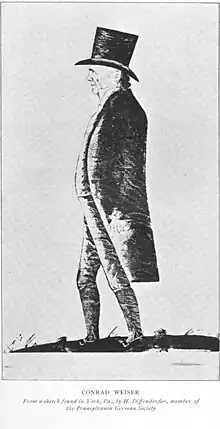| Weiser State Forest | |
|---|---|
 Roaring Creek Trail in the Roaring Creek Tract | |
 Location of Weiser State Forest in Pennsylvania | |
| Location | Pennsylvania, United States |
| Coordinates | 40°37′49″N 76°11′35″W / 40.63028°N 76.19306°W |
| Area | 17,961 acres (72.69 km2) |
| Governing body | Pennsylvania Department of Conservation and Natural Resources |
| Website | Weiser State Forest |
Weiser State Forest is a Pennsylvania State Forest in Pennsylvania Bureau of Forestry District #18. The main offices are located in Cressona in Schuylkill County, Pennsylvania in the United States.
The forest is located on several small tracts in Carbon, Columbia, Dauphin, Northumberland, and Schuylkill counties. District #18 also includes Lebanon and Montour counties.
History
_1.JPG.webp)
Weiser State Forest was formed as a direct result of the depletion of the forests of Pennsylvania that took place during the mid-to-late 19th century. Conservationists like Dr. Joseph Rothrock became concerned that the forests would not regrow if they were not managed properly. Lumber and iron companies had harvested the old-growth forests for various reasons. They clear cut the forests and left behind nothing but dried tree tops and rotting stumps. The sparks of passing steam locomotives ignited wildfires that prevented the formation of second growth forests. The conservationists feared that the forest would never regrow if there was not a change in the philosophy of forest management. They called for the state to purchase land from the lumber and iron companies and the lumber and iron companies were more than willing to sell their land since that had depleted the natural resources of the forests.[1] The changes began to take place in 1895 when Dr. Rothrock was appointed the first commissioner of the Pennsylvania Department of Forests and Waters, the forerunner of today's Pennsylvania Department of Conservation and Natural Resources. The Pennsylvania General Assembly passed a piece of legislation in 1897 that authorized the purchase of "unseated lands for forest reservations." This was the beginning of the State Forest system.[1]

The forest is named for Conrad Weiser, an important Pennsylvanian in colonial days, especially known as an interpreter and emissary in councils between Native Americans and Pennsylvania.
Prior to the July 1, 2005 realignment of Pennsylvania State Forest Districts, Weiser State Forest encompassed 17,961 acres (7,269 ha) and District #18 included Carbon, Dauphin, Lebanon, Schuylkill, and the northern parts of Berks and Lehigh counties. After realignment, the state forest tracts in Columbia and Northumberland counties were added to Weiser State Forest, and Montour county became part of District #18 (they had previously been in Wyoming State Forest and District #20). Weiser State Forest and District #18 also lost territory as all of Berks and Lehigh counties became part of "Valley Forge State Forest" (renamed William Penn State Forest in August 2007) and District #17.
Neighboring state forest districts
- Loyalsock State Forest (north)
- Pinchot State Forest (north)
- Delaware State Forest (east)
- William Penn State Forest (southeast)
- Michaux State Forest (southwest)
- Tuscarora State Forest (west)
- Bald Eagle State Forest (northwest)
- Tiadaghton State Forest (northwest)
The Appalachian Trail runs through the state forest lands.
References
- 1 2 "History of the William Penn State Forest". Pennsylvania Department of Conservation and Natural Resources. Archived from the original on 2007-08-23. Retrieved 2007-08-29.
- "Weiser State Forest". Pennsylvania Department of Conservation and Natural Resources. Archived from the original on February 26, 2004. Retrieved 2006-07-14. Note: As of July 2006, this web page has not been updated to reflect the Pennsylvania State Forest Districts realignment.
- "DCNR REALIGNING FOREST DISTRICTS". Pennsylvania Department of Conservation and Natural Resources. June 2005. Archived from the original on March 3, 2016. Retrieved 2006-07-14. Alt URL
- "State Forest Districts". Pennsylvania Department of Conservation and Natural Resources. Archived from the original on 2006-05-15. Retrieved 2006-07-14. Note: Map showing districts after the July 1, 2005 realignment